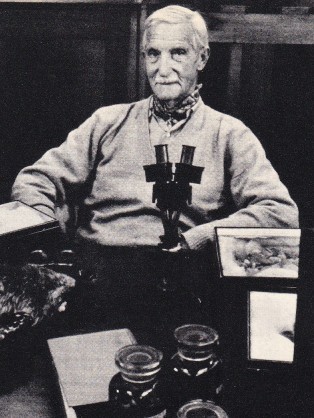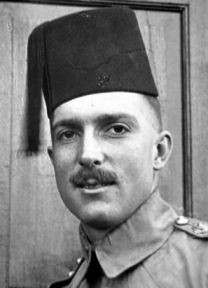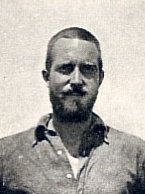Back to search results
Name: MEINERTZHAGEN, Richard Henry CBE, DSO (Col.)



Birth Date: 3.3.1878 Knightsbridge, London
Death Date: 17.6.1967 Kensington, London
Nationality: British
First Date: 1902 - Royal Fusiliers in India
Profession: Army Officer transferred to KAR in 1902, ornithologist & author.
Area: 1902 Nyeri
Married: 1. In Droxford, Hants. 1 Sep 1911 (div. 1919) Armorel Le Roy Lewis b. 31 Mar 1890 Chelsea, d. 9 Jan 1967 (as Lady Dunne); 2. In Kensington 1921 Annie Constance Jackson b. 1889 Kiltearn, Ross-shire, d. 6 July 1928 Swordale, Ross-shire, ?killed by her husband
Children: Anne (1921); Daniel (1925); Randle (1928)
Author: 'Kenya Diary' 1957 [very unreliable]
Book Reference: Gillett, Cuckoo, Best, Oscar, Army Diary, Kenya Diary, Wymer, Rundgren, Cocker, Debrett, EAHB 1905, Hut, North, EA & Rhodesia, EA Diary 1903, Drumkey, Land, EAHB 1906, DSO, Gazette, EAHB 1904, Chandler
War Service: WW1 in EA, Palestine & France. Royal Fusiliers attached KAR
School: Aysgarth, near Bedale, Yorkshire. Fonthill, Sussex. Harrow
General Information:
Best - pages 54-57
Oscar - ' Oscar knew him as the director of Military Intelligence and disliked the man for his braggart manner, and for the way he shot large numbers of big game and published his achievements, thus encouraging others to do the same.'
Web Colonel Meinertzhagen was a complex man. The result of an English public school system and an aristocratic family. He was from an early age surrounded by quite remarkable people. Huxley, Darwin and Herbert Spencer met at his home. His father was Daniel Meinertzhagen VI. Head of a merchant-bank dynasty with an international reputation, which was second only to the Rothschild’s banks. His mother was Georgina Potter, sister of Beatrice Webb, a co-founder of the London School of Economics and a formidable intellect.
Army Diary - 1915 - Mombasa - 'In the evening I strolled into the Mombasa Club, a pot-house dedicated to Bacchus and Dame Rumour. I found a general meeting in full swing. The motion before the members was one to remove from the books of the club all members of German nationality. I sat down hoping for some amusing speeches. I was at once addressed by the chairman, Judge Hamilton, as "that officer in uniform" in a most offensive manner, and was requested to leave the club-room, as only members were permitted to attend the general meeting. Practically all soldiers out here are temporary members only, but, as I had been on the books of the Club since I first entered EA in 1902, I rose to my feet and told the chairman that I was an older member of the Club than either him or any other member in the room, which, on investigation, proved correct. So I stuck to my chair, and made faces at the chairman for the rest of the meeting.
The Mombasa Club is proprietory and here was a general meeting to decide as to whether Germans should remain members of the Club or not. All agreed that they should be removed, but I asked the proprietor whether he was sure that when the war was over the German members might not sue him for heavy damages for breach of contract. The proprietor suggested that every member should guarantee £10 against loss by legal proceedings. Many members left the room at once, others moved towards the door and the meeting closed without any Germans being removed from the books of the Club. It is surprising what effect money has on principles!'
Kenya Diary - 1902 - Nairobi - My brother officers are mainly regimental rejects and heavily in debt. One drinks like a fish, one prefers boys to women and is not ashamed. On arrival here I was amazed and shocked to find that they all brought their native women into mess; the talk centres round sex and money and is always connected with some type of pornography. Being very junior I cannot do much about it, but I objected not only to the tone in mess but also to native women being brought into mess; they told me that if I did not like it I could return whence I came, so I wrote out a complaint and asked them to read it and said that if they did not reform at once I should send it in officially. They were furious but complied. .....…..
Cocker - 1899 - gazetted to the Royal Fusiliers ...... to India .... April 1902 - appointment with the KAR ............. punitive measures taken against the Kihimbuini, a branch of the Kikuyu that had earlier attacked the mail party. The officer in charge informed him that the tribe had only recently seized a white man while he was attempting to buy sheep, dragged him to their village and pegged him to the ground. The whole village had then urinated into his open mouth until he had drowned. Again M. felt the need for instant justice, or, rather, revenge. Attempting to achieve the same element of surprise as he had a fortnight earlier, he made a night march to the edge of the village, and against a background of beating war drums and flickering village fires, gave the order to take no prisoners except children.
In the event, not a soul survived the assault, although, fortunately, many of the young women and children had been evacuated the previous day. The political officer, Maclean, who had been with M. at the time, refused to consent to the action, but promised not to interfere if he wished to proceed. The decision, therefore, to slaughter the entire village - both men and women - had been taken almost entirely by a 24 year old Lieutenant. ....... 1906 - to England; 1907 to South Africa and 1909 back to England. He then went to the Crimea for a holiday and as a spy. ...... in 1912 he returned to India where Armorel was unfaithful. In 1914 he was back in EA for the EA campaign. In 1917 he was sent to Palestine for the Palestine Campaign.
Debrett - entered Roy. Fusiliers 1899, became Major 1915, and Brevet Lieut.-Col. 1918; transferred to Duke of Cornwall's L.I. 1923 and retired as Col. 1925; E. Africa 1904 (medal with clasp), Nandi Field Force 1905-6 (wounded, despatches, clasp), E. Africa 1914-16 (despatches, DSO), Palestine 1917 (Brevet Lieut.-Col.) was a Gen. Staff Officer at War Office 1918, at Peace Conference 1919, and a Ch. Political Officer, Syria and Palestine 1919-20; appointed Mil. Adviser, Middle East Dept. 1921
East Africa & Rhodesia - 3/1/57 - CBE
Land - 1907 - R. Meinetzhagen - Building, 10 acres, Nairobi Hill, 13-4-04, Registered 15-4-07
Gazette 15/7/1902 - Issued with Public Officer's Game Licence - 19/5/02
Chandler - Long three page entry
EAHB 1905 - 3rd KAR, Nairobi
Wikipedia - Annie Meinertzhagen died at her estate at Swordale on 6 July 1928, just over three months after the birth of her third child,[3] in an apparent shooting accident in the presence of her husband. The circumstances of her death were controversial, though no inquest or enquiry took place.[7] Richard Meinertzhagen’s diary entry for 1 August 1928 reads:
”I have not written up my story for some weeks not because I have had nothing to say but because my heart has been too full of sorrow my soul too overwhelmed with unhappiness. My darling Annie died on July 6th as a result of a terrible accident at Swordale. We had been practising with my revolver and had just finished when I went to bring back the target. I heard a shot behind me and saw my darling fall with a bullet through her head.”[5]
Brian Garfield comments, in his exposé of Richard Meinertzhagen’s life and character:[7]
”To those who believe that Annie’s death was no accident, the circumstantial evidence seems persuasive. The path of the bullet would seem to create doubt as to whether she could have inflicted the wound on herself. RM was at least a foot taller than his wife, so a downward shot through her head and spine – especially if she were leaning forward a bit – could have been fired much more readily by him than by her.
”It is argued that Annie would not likely have shot herself by accident. She was an expert with firearms, having grown up with them in the landed hunting set and having spent years hunting birds all over the world and providing specimens to the leading museums.”
”Those who believe she was murdered point out that if ever in RM’s long and bloody career there was a smoking gun, this was that case – literally, with its bullet driven through Annie’s head and spine at point-blank range. They cite the standard homicide trinity; method, opportunity, and motive. Annie was shot to death at close range; her husband was the only witness; she died under suspicious circumstances at a time when her death was very much to his benefit because, they point out, it kept her from exposing his bird thefts, it freed him to carry on with his pubescent cousins, and it left him with a large income for life.”
Back to search results



